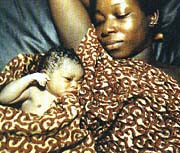
Mother and newly-born child, Ghana
© Nancy Durrell McKenna
We now know that voluntary family planning has been very effective. Over the last 30 years, the percentage of couples in developing countries using family planning has increased from 10 per cent to 50 per cent. Access to family planning, coupled to economic development, has caused a marked decline in developing world fertility, from six children in 1960 to three today.

HIV/AIDS, which is almost exclusively spread by heterosexual intercourse in the developing world, is one of the biggest challenges in the field of sexual and reproductive health, especially in sub-Saharan Africa.
The Cairo Conference also tackled three areas which previous international meetings had avoided or glossed over:

Adolescent sexual and reproductive health is perhaps the most urgent task for the international community. There are now more than one billion adolescents aged 10-19 in the world - and 85 per cent of them live in developing countries. These teenagers are tomorrow's parents. Their decisions about when to have children will have dramatic implications for their own well-being and for that of the planet. The outcome also depends on the quality of reproductive health services they receive. Better services could prevent millions of deaths among mothers and children; prevent hundreds of millions of abortions; and lead to lower overall population growth.
The great achievement of the Cairo Conference was that the international community recognised for the first time what many had argued for years:
|
Links to useful publications and documents available online: People & the Planet feature Speeding the reproductive revolution The Population Reference Bureau published a new reproductive health report, Hidden Suffering: Disabilities From Pregnancy and Childbirth in Less Developed Countries (August 2002) The International Planned Parenthood Federation (IPPF) has produced the IPPF Charter on Sexual and Reproductive Rights In July 2004, UNAIDS published the 2004 Report on the global AIDS epidemic. The Panos Institute has produced four relevant briefing documents:
Amnesty International has published an information pack on Female Genital Mutilation (FGM). And the World Health Organisation has published a Factsheet on FGM. |
© People & the Planet 2000 - 2007